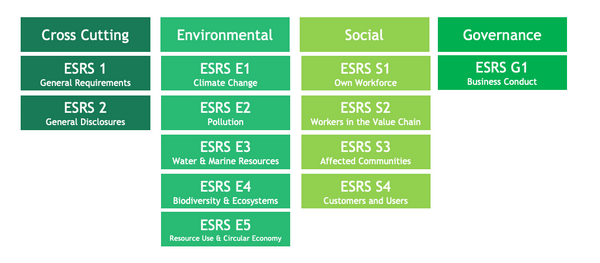The EU Approves the European Sustainability Reporting Standards (ESRS)

In this note, Tim Mohin reports that the big news of last week is that the final version of the European Sustainability Reporting Standards (ESRS) has been approved by the EU Commission, covering a wide variety of topics. The finalized ESRS will now go to the European Parliament and Council for a 2-month period of scrutiny starting in the second half of August. The standards can now only be rejected but not amended.
Here’s an excerpt from Tim’s note about the mixed reaction to the final standards:
Controversy broke out a few weeks ago when the Commission seemed to water down the mandate by allowing companies to opt out of reporting on any of these standards by concluding they are not material to their business (with the exception of ESRS 2 General Disclosures). Materiality is a concept common to financial reporting, but none-the-less drew fire from activists as a rollback.
The final version included the materiality provision and received a mix of praise and criticism. Some claimed the changes were a watered-down version of the original ESRS proposals created by the European Financial Reporting Advisory Group (EFRAG). Others praised the changes saying that interoperability with the International Sustainability Standards Board (ISSB), Global Reporting Initiative (GRI), and other reporting standards is a positive move.
The shift from mandatory reporting to allowing companies to report only on material topics continued to be controversial. “We regret that investors’ calls to retain key ESG indicators as mandatory have not been heard,” said Aleksandra Palinska, executive director of Eurosif “we are counting on the reporting companies to consider these disclosures as always material.”
However, others, like EU Finance Commissioner Mairead McGuinness, said the standards “strike the right balance between limiting the burden on reporting companies while enabling companies to show the efforts they are making to meet the Green Deal agenda.”
The International Sustainability Standards Board (ISSB) issued a statement claiming that the shift to materiality-based disclosure added to a “very high level of alignment” with their recently finalized climate standard (S2). ISSB Chairman Emmanuel Faber said: “Much progress has been achieved. We have substantially advanced the reduction of the duplicative disclosure burden, reflecting our respective mandates. Those applying ISSB Standards as well as ESRS will be able to use our navigation tool.”
